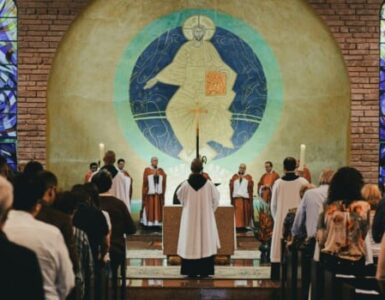If only I had attained Christian perfection already. If only I didn’t have to struggle against that sin anymore. If only I could immerse myself in prayer without distraction. If only I could understand that difficult scripture passage once and for all.
A sure sign that we are erring from the path of Christian perfection is to believe that, when we reach it, nothing will change for us and nothing will tempt us. In Chapter 38 of the Way of Perfection, Saint Teresa of Avila writes, “I consider it quite certain that those who attain perfection do not ask the Lord to deliver them from trials, temptations, persecutions, and conflicts.” She goes on to say that “perfect souls are in no way repelled by trials, but rather desire them and pray for them and love them.” If we expect nothing from prayer but consolation and divine favor, we suffer from the “delusion” that “we are giving and serving, and that the Lord will be obliged to reward us” (ibid.).
Yet another way to conceive of this erroneous path is to think that Christian perfection leaves no room for hope, for hope always implies a yearning for and inclination toward something not yet attained. This is precisely why Saint Teresa finds a military analogy so apt for understanding the way to perfection. Souls who have attained Christian perfection “are like soldiers: the more wars there are, the better they are pleased, because they hope to emerge from them with the greater riches. If there are no wars, they serve for their pay, but they know they will not get very far on that” (ibid.).
The virtue of hope corresponds to the desire for happiness that God has implanted in our souls. The closer we grow to Christ, the more deeply we realize that, ultimately, such happiness is not to be found in this world, but only with Him in the next. “God,” writes C. S. Lewis, “cannot give us a happiness and peace apart from Himself, because it is not there. There is no such thing” (Mere Christianity). Our desire to be with Him is precisely what inspires our activities in this world, purifying them so that they are ordered to the Kingdom of Heaven. In short, by hope we are “preserved from selfishness and led to the happiness that flows from charity” (CCC, 1818).
It’s no accident that Teresa’s spiritual masterpiece is entitled The Way of Perfection and not The State of Perfection. Her fellow Carmelite, John of the Cross, wrote The Ascent of Mount Carmel and not The Summit of Mount Carmel. The biblical way of expressing this is to emphasize that we are all pilgrims.
Abraham is the paradigmatic pilgrim. God calls him to leave the home of his father and to settle in the land of Canaan. He is driven by a hope in God’s promise that his offspring will be as numerous as the stars in the sky and the grains of sand on the seashore (cfr. Gen. 15:5; 22:7). Saint Paul extols Abraham as an example of hope, for “he believed, hoping against hope, that he would become ‘the father of many nations,’” (Rom 4:18). “Hoping against hope” means that Abraham hoped beyond a mere human hope. In worldly terms, it made no sense for a hundred-year-old man to hope for children, especially with a sterile wife. Paul’s point is that this worldly hope is confronted with a new hope, a divine hope, a hope that would have been impossible without faith. “He did not doubt God’s promise in unbelief; rather, he was empowered by faith and gave glory to God and was fully convinced that what He had promised He was also able to do” (Rom. 4:20).
There is one more absolutely essential element to the story of Abraham—and Paul’s retelling of it in his Letter to the Romans: hope and the pilgrimage it entails are communal. Abraham’s pilgrimage was ordered to the production of numerous offspring, and Paul’s teaching that Abraham’s faith was credited to him as righteousness is “also for us . . . who believe in the one who raised Jesus our Lord from the dead” (Rom 4:24). We make this pilgrimage of faith together or not at all.
Pope Francis could not have made this clearer in his Bull of Indiction for the Jubilee of Hope, Spes non confundit, when he decreed that:
On Sunday, 29 December 2024, in every cathedral and co-cathedral, diocesan bishops are to celebrate Holy Mass as the solemn opening of the Jubilee Year . . . A pilgrimage that sets out from a church chosen for the collectio and then proceeds to the cathedral can serve to symbolize the journey of hope that, illumined by the word of God, unites all the faithful (par. 6, [emphasis added]).
Francis desires all the faithful to experience what it means to walk together in hope, what it means to be a pilgrim. With the inauguration of the Ordinary Jubilee on Christmas Eve, when the Holy Door of Saint Peter’s Basilica was opened, Francis writes that “we are about to make a pilgrimage marked by great events, in which the grace of God precedes and accompanies his people as they press forward firm in faith, active in charity, and steadfast in hope (cf. 1 Thess 1:3).”
Authentic Christian hope reminds us that we are always on the way. Not until we reach the glory of heaven promised by God can we rest. “Dream,” writes Saint Teresa, “that the more you struggle, the more you prove the love that you bear your God, and the more you will rejoice one day with your Beloved, in a happiness and rapture that can never end” (Exclamaciones del alma a Dios, 15, 3).












